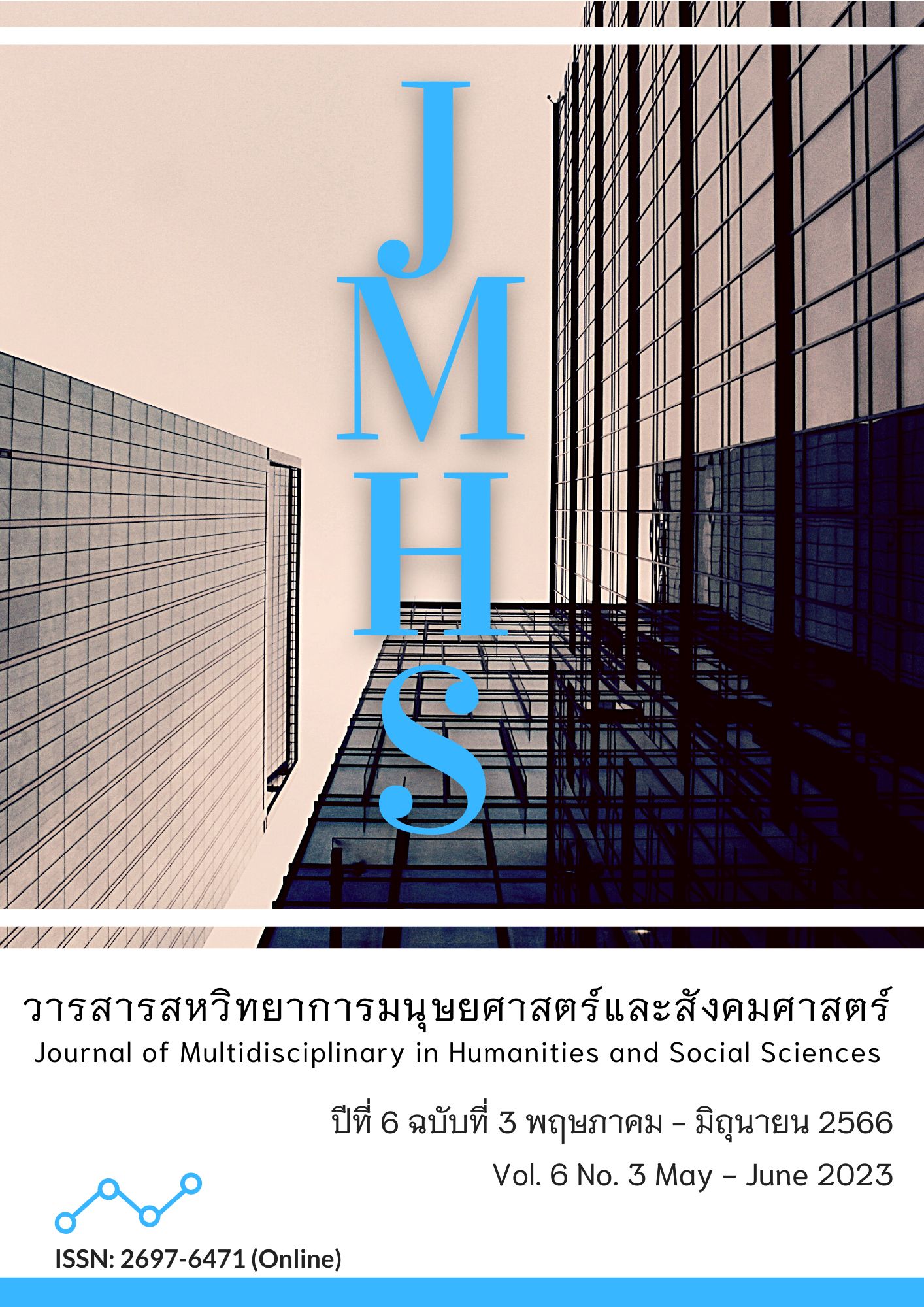The Administration of the Organization through School Innovation in Office of the Primary Educational Service Area, Education Region 18
Main Article Content
Abstract
This article aimed to 1) study the condition of transformational leadership knowledge management Organizational atmosphere and innovative organization of schools under the Office of the Primary Educational Service Area, Education Region 18; 2) analyze the factors of transformational leadership, knowledge management, and organizational atmosphere that affect the innovative organization of schools; and 3) present guidelines for developing management into an innovative organization of schools under the Office of the Primary Educational Service Area, Education Region 18. The sample group was administrators, teachers, and educational personnel—377 people. by a multi-step random selection. Statistics used in data analysis were frequency, percentage, mean, and standard deviation, and stepwise multiple regression correlation coefficient analysis.
The research results were as follows: 1) The results of the study of management conditions in terms of transformational leadership, knowledge management, organizational climate, and innovative organizations in schools under the Office of the Primary Educational Service Area, Education Region 18, were at a very high level; 2) Factors of transformational leadership, knowledge management, organizational climate, and innovative organizations in schools under the Office of the Primary Educational Service Area, Education Region 18, have 31 out of 65 factors affecting innovation organizations. The aforementioned variables were able to predict the dependent variables at 93.20% with statistical significance at the.05 level; and 3) A summary of the management approach towards innovative organization of schools under the Office of the Primary Educational Service Area, Education Region 18, has six approaches, consisting of (1) developing the potential of administrators; (2) developing school operations; (3) developing the use of media teacher technology; (4) promoting public relations and information dissemination; (5) promoting learning and the exchange of knowledge; and (6) transforming knowledge to develop professionals and communities.
Article Details

This work is licensed under a Creative Commons Attribution-NonCommercial-NoDerivatives 4.0 International License.
Views and opinions appearing in the Journal it is the responsibility of the author of the article, and does not constitute the view and responsibility of the editorial team.
References
กระทรวงศึกษาธิการ. (2553). พระราชบัญญัติการศึกษาแห่งชาติ พ.ศ. 2553 (ฉบับที่ 3). กรุงเทพฯ: สยามสปอรต์ ซินดิเคท.
จักรพันธ์ พันธ์หินกอง และ ชูชาติ พ่วงสมจิตร์. (2562). ภาวะผู้นำการเปลี่ยนแปลงของผู้บริหารสถานศึกษาที่ส่งผลต่อการเป็นองค์การแห่งการเรียนรู้ของสถานศึกษาขั้นพื้นฐานในสังกัดสำนักงานเขตพื้นที่การศึกษามัธยมศึกษา เขต 7. วารสารมหาวิทยาลัยศิลปากร, 39(5), 128-14.
เจนนารา สิทธิเหรียญชัย. (2541). บรรยากาศองค์การกับความผูกพันในงานของอาจารย์พยาบาลวิทยาลัยพยาบาล สังกัดกระทรวงสาธารณสุข. เชียงใหม่: มหาวิทยาลัยเชียงใหม่.
ณิชาณัช เกศมุกดา และ ประไพศรี สุทัศน์ ณ อยุธยา. (2018). การเพิ่มสมรรถนะองค์กรการผลิตโดยการสร้างองค์กรนวัตกรรมผ่านการจัดการความรู้. วารสารการจัดการสมัยใหม่, 15(2), 91-100. สืบค้นจาก https://so04.tci-thaijo.org/index.php/stou-sms-pr/article/view/116311
ตรี ภูวิโคตรธนกุล, วัลลภา อารีรัตน์ และ ประกฤติยา ทักษิโณ (2562). โมเดลภาวะผู้นำของผู้บริหารสถานศึกษาที่ส่งผลต่อสมรรถนะครูในการจัดการเรียนรู้ตามแนวสะเต็มศึกษา: โมเดลแข่งขันภาวะ. วารสารบริหารการศึกษา มหาวิทยาลัยขอนแก่น, 15(2), 70-84. สืบค้นจาก https://so02.tci-thaijo.org/index.php/EDMKKU/article/view/215463
นพพร ล่ำสัน. (2558). ภาวะผู้นำและสมรรถนะผู้บริหารที่ส่งผลต่อความเป็นเลิศของสถานศึกษา(วิทยานิพนธ์ปรัชญาดุษฎีบัณฑิต สาขาวิชาการบริหารการพัฒนาองค์การ), มหาวิทยาลัยเจ้าพระยา.
มณีนุช ทรวงสุรัตนกุล. (2559). อิทธิพลของผู้บริหารระดับกลางในการพัฒนาองค์กรให้เป็นองค์กรแห่งนวัตกรรม กรณีศึกษา: บริษัท ทรู คอร์ปอเรชั่น จำกัด (มหาชน). Veridian E-Journal, Silpakorn University (Humanities, Social Sciences and Arts), 9(1), 283-297. สืบค้นจาก https://he02.tci-thaijo.org/index.php/Veridian-E-Journal/article/view/52792
วัฒนชัย ศิริญาณ, วิทยา เจริญศิริ และ สัญญา เคณาภูมิ. (2560). องค์กรแห่งนวัตกรรม: ทางเลือกใหม่สาหรับการพัฒนาในศตวรรษที่ 21. อินฟอร์เมชั่น, 24(2), 72-80. สืบค้นจาก https://infojournal.kku.ac.th/index.php/information/article/view/75
ศุภชัย ศรีสุชาติ. (2563). พัฒนา SKILL เดิม เพิ่มเติม SKILL ใหม่ ฝ่ามรสุมเศรษฐกิจแหวกคลื่น DISRUPTION. สืบค้นจาก https://tu.ac.th/thammasat-expert-talk-re-skill-up-skill-digital-disruption
สมนึก เอื้อจิระพงษ์พันธ์. (2553). รูปแบบการพัฒนาความสามารถในการจัดการความรู้ของผู้ประกอบการที่มีนวัตกรรมในประเทศไทย. กรุงเทพฯ: จุฬาลงกรณ์มหาวิทยาลัย.
อนุพงษ์ ชุมแวงวาปี, สุเมธ งามกนก และ สมพงษ์ ปั้นหุ่น. (2561). การพัฒนารูปแบบองค์การแห่งนวัตกรรมของโรงเรียนมัธยมศึกษาสังกัดสำนักงานคณะกรรมการการศึกษาขั้นพื้นฐาน. วารสารศึกษาศาสตร์ มหาวิทยาลัยมหาสารคาม, 12(3), 207-219.
อรุณี ไพศาลพานิชชย์กุล. (2560). องค์การนวัตกรรม: มโนทัศน์ และตัวแบบเชิงทฤษฎี. วารสารพัฒนบริหารศาสตร์, 57(3), 158-187. สืบค้นจาก https://so04.tci-thaijo.org/index.php/
NDJ/article/view/104672
Bass, B. M., & Avolio, B. J. (1994). Improving Organizational Effectiveness Through
Transformational Leadership. London: Sage.
Christiansen, J. A. (2000). Building The Innovative Organization: Management Systems That
Encourage Innovation. Hampshire: Macmillan Press.
Dayan, R., & Evans, S. (2006). KM your way to CMMI. Journal of Knowledge Management,
(1), 69-80. https://doi.org/10.1108/13673270610650111
Freeze, R. D., & Kulkarni, U. (2007). Knowledge Management Capability: Defining Knowledge
Assets. Journal of Knowledge Management, 11(6), 94–109. https://doi.org/10.1108/136732
Holloway, J. B. (2012). Leadership Behavior and Organizational Climate. Emerging Leadership
Journeys, 5(1), 9- 35.
Kinichi, A., & Williams, B. (2009). Management. New York: McGraw-Hill.
Krejcie, R. V., & Morgan, D. W. (1970). Determining Sample Size for Research Activities. Educational and Psychological Measurement, 30(3), 607-610.
Senge, P. et al. (1994). The Fifth Discipline Field Book Strategies and Tools for Building a Learning Organization. New York: Currency Doubleday.


